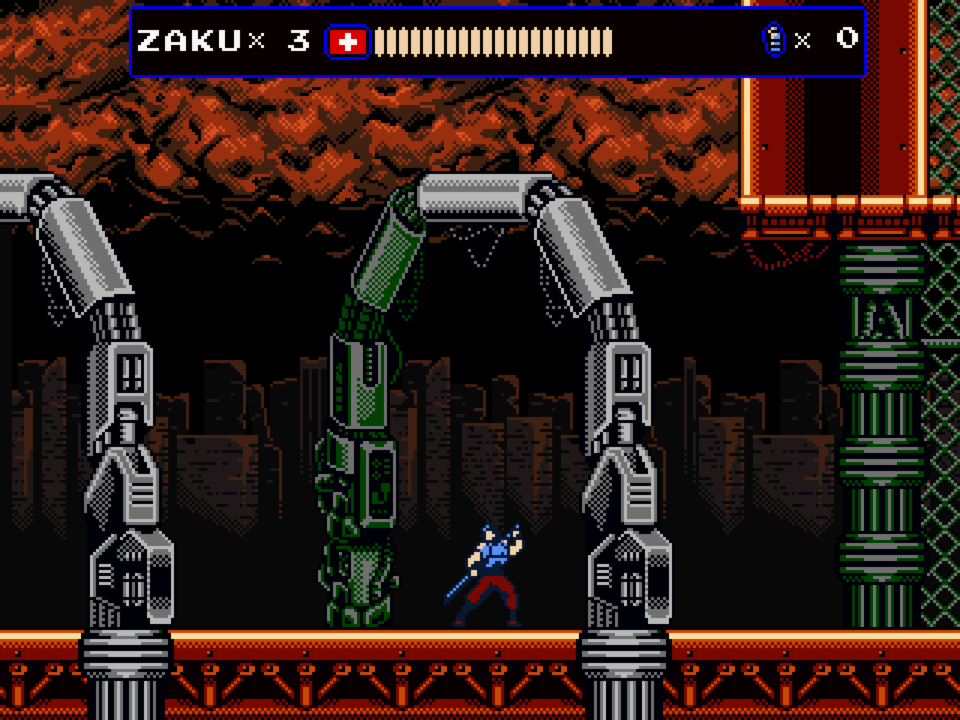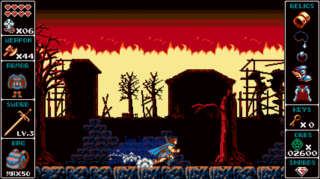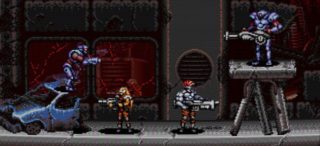Joymasher is the developer of Oniken and Odallus, two pixel-art titles inspired by various NES action games. The developer is based out of Sao Paulo, Brazil. The studio is led by Danilo Dias, his wife Thaís Weiller and their friend Marco Galvão. When they started out, Danilo confirmed that they weren’t operating under the mentality of making an “indie” game.
“Well, to be honest at the time I started making Oniken I didn’t even knew what an indie game was!” said Danilo, laughing. “I just wanted to make a fun action 8-bit game, like the ones that I used to play as a kid. Every time that I think about making a game, I ask myself, ‘Hum… I think that I want to make a Contra-like game, or a Castlevania-like game’ and so on. I know that this isn’t something refined or creative but I really love games from 8/16-bit era and I want to make games like these.”
How Joymasher Works
Danilo works with Thaís on game design and their projects; she also does all of the administrative decisions for Joymasher. While Danilo has been full-time with Joymasher since the start, Thaís was originally working as a game designer at Samsung before shifting all of her attention to Joymasher.
“During Odallus I was working on coding and graphics, Thaís my wife worked on revising the overall game and level design,” Danilo described. “It was easy for us to work together because she sits beside me and played a lot of it and gave me plenty of feedback. I sit beside her and write all the feedback on small pieces of paper; that was most of our weekends.”


“The rest of the crew like Marco we interacted by Gtalk and Skype. During the Odallus launch, Marco traveled to Manaus/Amazon so we could create ‘crisis room’!” chuckled Danilo. “The launch was hard, lots of last hour fixes and small problems.”
Inspired by Japan

Brazil has its own unique console traditions, due to the way its government taxes imported technology. As such, Sega had much more of a presence in the country working with Brazilian company Tectoy compared to Nintendo in the era of 8-bit and 16-bit games. Despite these hurdles, Danilo says they were able to experience many of the Nintendo Entertainment System (NES) games that contemporary American gamers would have as well.
“Here in Brazil, Master System was a big hit, but we also had lots of Brazilian NES clones, like Turbo Game, Phantom System and Bit System,” Danilo detailed. “That’s how I got in contact with NES games, but aside from that, Master System games like Kenseiden and Wonder Boy in Monster Land had a great impact in the development of Odallus. I also was inspired by Chakan: The Forever Man for Genesis.”

The list of gaming inspirations for Odallus and Oniken is extensive, including Ninja Gaiden II, Castlevania 3, Vice: Project Doom, Kabuki Quantum Fighter, Shatterhand, Contra, Streets of Rage 2 , Strider, Ghouls ‘n Ghosts, Revenge of Shinobi, Super Metroid, Mega Man X and Super Castlevania IV. When it comes to non-gaming inspirations, Danilo cited old movies and anime that they liked.
“For instance, Oniken has great inspiration from Fist of the North Star and M.D. Geist, two of my favorite animes,” Danilo noted. “Odallus has inspiration from Highlander, one of my favorite movies from all time!”
While most of the sources Danilo mentioned are self-serious, there’s also an element of corniness to many of them, with violence so exaggerated it seems almost to be parodying itself or oddball names that were either poorly or very literally translated from their original Japanese (Danilo said that this inspired the Oniken level named “Brain Palace”). Still, he wants to keep it at an occasional nod and wink, not a constant tempo of references and bad jokes.
“I like to put some humor and small jokes in our games, like Haggis: the name of the main character from Odallus. Haggis is a Scottish food made out of sheep guts - it’s kinda reference to Guts from Berserk anime!” Danilo said. “I love to put some stuff like this but I don’t want the game to be like a bunch of references jokes from other games so I have to find a balance between these jokes and the some seriousness for the game itself.”
Capturing the Feel of the NES
One of the major aesthetic choices for both Oniken and Odallus is using the color palette of the NES and the like. It’s actually quite hard to make a modern game conforming to the NES hardware, so Joymasher has picked certain elements to maintain a certain look while not slavishly obeying the limitations.

“For the art, I like to make an art style that emulates the NES original limitations, however I do not follow it exactly like the NES hardware,” Danilo detailed. “During my work on my first game Oniken, I noticed that if I stick with NES limitations like three colors per tile, do not use transparencies and keep the palette similar to the NES palette, I could put a NES feel into the game without be restricted to all limitations. That’s why in Odallus I’ve used a lot of parallaxes, big sprites and even some particles and the game still looks like an NES game. I think that colors and the way that you animate sprites and overall art-style have much more impact to emulate a system than following it’s restrictions exactly, leaving a good space to create cool visuals that were not possible during that specific era.”
Joymasher isn’t the only developer to embrace the style of NES games, with Vblank Entertainment’s Retro City Rampage, Thomas Happ Games’ Axiom Verge, and Yacht Club Games’ Shovel Knight all being prominent examples. They’re certainly not the only ones, however, and as reflected in Danillo’s favorite pixel art games. “I really love the work of Locomalito, I’m a big fan of his art and games,” he said. “I also love the work of my friend Glauber Kotaki, he’s one of the artists behind Duelyst and Chasm.”
Of course, these games weren’t exclusively inspired by games of the 8 and 16-bit era. “I’m a big fan of Souls series,” said Danilo. “I was heavily inspired by Demon Souls while working on Odallus. The way that stages are almost like small Metroid-like maps but they’re still stages, I took lots of design ideas from it.”
Odallus: Kids Love it!
Games like Oniken and Odallus are obviously meant to appeal to gamers who grew up playing NES games. However, Danilo says the reaction by kids were the most interesting.
“Young kids didn’t grow up with old NES games, but every time that I see a kid playing one of our games, it’s generally a positive experience. They see the game as ‘whoa this is supposed to be a hard game like the ones from the past!’ They embrace the challenge and have fun with the game.”
“I remember seeing a six year-old kid playing Odallus for a really long time in a U.S. event that we went to and after some time he already understood how to avoid lots of enemies and he was doing lots of tricks!” Danilo added. “I was really happy to see that.”
The Future Written in Chrome
Despite the fact that Odallus and Oniken are homages to classic home console games, they are currently only available for various PC platforms (Windows, OSX and Linux). Danilo revealed, however, that it’s not due to lack of desire that Odallus and Oniken are not on any console platform.
“Multimedia Fusion 2 the engine that Odallus was built on does not export for PS4 or other consoles,” Danilo explained. “Because of that, during half of this year I was working on a PS4 port of Odallus rebuilt from scratch in Unity engine with a friend of mine. However we’re not experienced enough and we ran into a lot of problems. Because of the amount of time and money that [was required to finish] the project, we decided to cancel it and work on a new Joymasher game. It was hard but it was necessary.”
This is sad news to hear for console owners who were hoping Odallus and Oniken might come to their systems soon, but Danilo said that as much as they’d love to reach the large console audience, they simply lack the resources to rebuild them from the ground up. There’s hope that if their successive games do better that they can revisit the possibility of Odallus and Oniken on consoles, and there’s a good chance their games going forward will come to consoles.

“For now we’re using GameMaker, a good engine to make 2d games and it’s easy to port to other systems,” Danilo revealed.
When asked what their next project would be exactly, Danilo revealed, “We’re currently working on a 16-bit cyberpunk post apocalyptic run ‘n gun game! The project name is Blazing Chrome.”

With the move onto the 16-bit era, the natural question was whether the color pallet be based on the Genesis or Super NES, and Danilo said, “We’re trying to emulate Genesis hardware with a dash of 16-bit arcade systems.“
When the Genesis was mentioned, we inquired whether the seminal Contra: Hard Corps and Gunstar Heroes influenced the game, Danilo responded, “Yeah! And a little bit of Metal Slug!”
Comments










